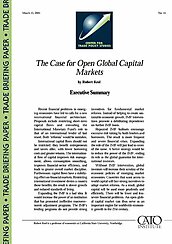International capital flows should not be restricted; they benefit entrepreneurs and savers alike, with lower borrowing costs and greater returns. The international flow of capital improves risk management, allows consumption smoothing, improves financial-sector efficiency, and leads to greater overall market discipline. Furthermore, capital flows have a stabilizing effect on financial markets. Restricting international investment denies a country those benefits; the result is slower growth and reduced standards of living.
Expanding the IMF is a bad idea. It would increase the power of an institution that has promoted ineffective macroeconomic adjustment programs. The IMF’s lending programs do not provide strong incentives for fundamental market reforms. Instead of helping to create sustainable economic growth, IMF interventions promote a debilitating dependence on further IMF loans.
Repeated IMF bailouts encourage excessive risk taking by both lenders and borrowers. The result is more frequent and severe financial crises. Expanding the role of the IMF will just lead to more of the same. A better strategy would be to reduce the power of the IMF, ending its role as the global guarantor for international investors.
Without IMF intervention, global investors will increase their scrutiny of the economic policies of emerging market economies. Countries that want access to world capital will face strong incentives to adopt market reforms. As a result, global capital will be used more prudently and efficiently. There will be fewer and less-severe financial problems. An open global capital market can thus serve as an important engine for worldwide economic growth in the 21st century.

